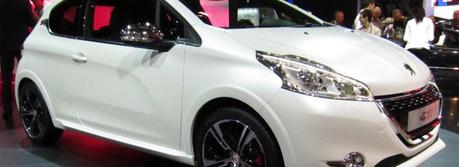
Peugeot 208 Hybrid FE basic design elements will be similar to other models like Peugeot 208 GTI (on the photo above) or Peugeot 208 XY (Credit: Overlaet http://commons.wikimedia.org/w/index.php?title=User:Overlaet)
Peugeot and Total have announced a new joint project: the 208 Hybrid FE. Their goal is to create a hybrid car that would combine performance (acceleration from 0 to 100km/h or to 62 mph in 8.0 seconds) with low carbon emissions (49g/km). This will utilize non plug-in petrol technology and will be based on already efficient mass-produced vehicles by Peugeot. The letters “FE” in the model name are supposed to stand for “Fuel and Economy” or even “Fun and Efficient.”
208 HYbrid FE, another way of moving towards the future
In 2011, Peugeot and Total renewed their collaborative research and exclusive recommendation agreement. Today, the two companies are involved in a project to offer future generations with mobility that combines energy efficiency (Fuel Economy) and driving pleasure (Fun & Emotion). To rise to this technological challenge, Total and Peugeot are combining their capacity for innovation to develop solutions for the mobility of future generations.
Peugeot, the Research and Advanced Technology Division of the PSA group, the Total group and several of its entities are coordinated by Peugeot Sport, used in human challenges, state-of-the-art technology and hybrid developments.
To give a firm foundation to this undertaking, the project is based on the very efficient 208 1.0 VTi 68hp, which will be extensively evolved. The style and the aerodynamics will be the first visible elements. Redesigned, the 208 HYbrid FE will be more aerodynamic with a much lower co-efficient of drag (Cd) than that of the production model, while retaining its occupant space. Special tyres and wheels will contribute to reduce rolling resistance.
The weight reduction will be a major contributor to the performance. In fact, the teams expect to achieve a 200kg reduction in the weight of the vehicle. Hutchinson and CCP Composites, subsidiaries of the Total group, will contribute their expertise in composite materials and polycarbonates. These will be used for the body panels, the windows and also in the passenger compartment.
The 208 HYbrid FE will also innovate with its hybrid drivetrain inspired by competition. It is a power unit which combines a 3-cylinder petrol engine and its EGC (Electronic Gearbox Controlled) gearbox with an electric motor and a battery taken directly from the endurance programmes. The engine will be adapted for this new application: special thermo-management and combustion cycle, reduction of friction, reduced weight of the reciprocating gears and of the cylinder head.
Peugeot and Total
Partners since 1995, Peugeot and Total groups are working together to significantly reduce the fuel consumption, emissions of CO2 and TCO (Total Cost of Ownership) of vehicles.
The Total group and several of its entities (Lubricants, Fuels, Hutchinson, CCP Composites, Total Global Polymers) are actively involved alongside Peugeot in numerous R&D projects permitting the production of more environmentally-friendly vehicles. Total provides Peugeot and its networks worldwide with FE (Fuel Economy) lubricants designed to reduce vehicle consumption by reducing friction in the engine. So, over ten years, Total lubricants have contributed to a 5% reduction in emissions of CO2 on PSA engines.
In France, close to 250 researchers are working on developing future automobile fuels and lubricants.Today, the researchers of the Total group are developing biofuels, low sulphur fuels, energy economy lubricants (Fuel-Eco lubricants), special additives guaranteeing reduced emissions, but also innovative materials to lighten the structures and enhance performance.
Peugeot is investing in a range of technology. Engines are an important area: continuous improvement of the efficiency of internal combustion engines, down-sizing strategy, standardisation of use of the particle emission filter, wider use of the Stop&Start, Diesel-electric hybrids, electric drive. Peugeot is also investing in the materials used to reduce the weight of the vehicles, increasing the proportion of green materials, without forgetting the connected services.
The result of these developments is positive as the Marque has the lowest emissions of CO2 in Europe. The leader, its average rating has decreased by 7g/km to only 121.6g/km in 2012. So two in every three Peugeot vehicles emit less than 130g of CO2/km.

